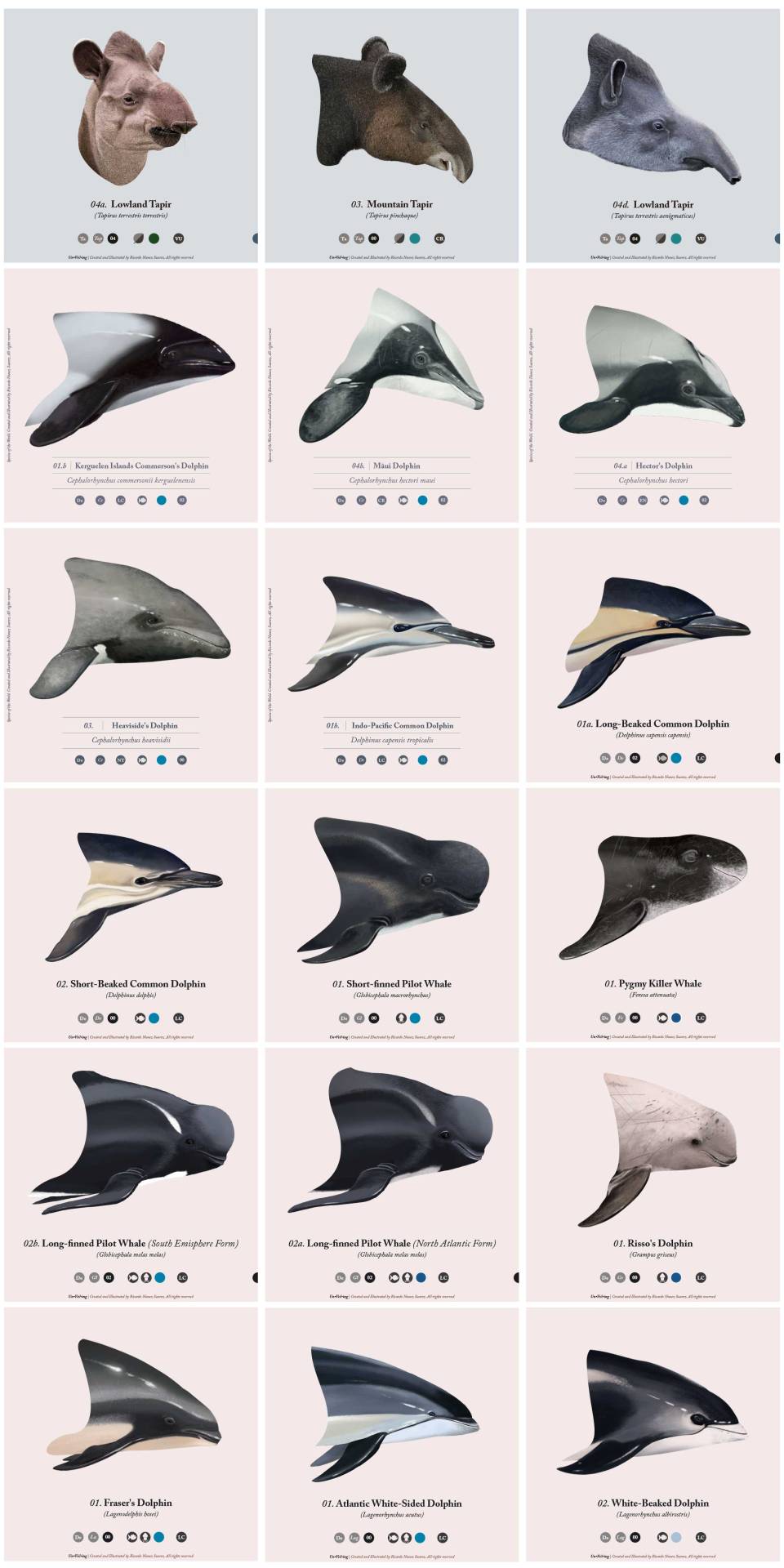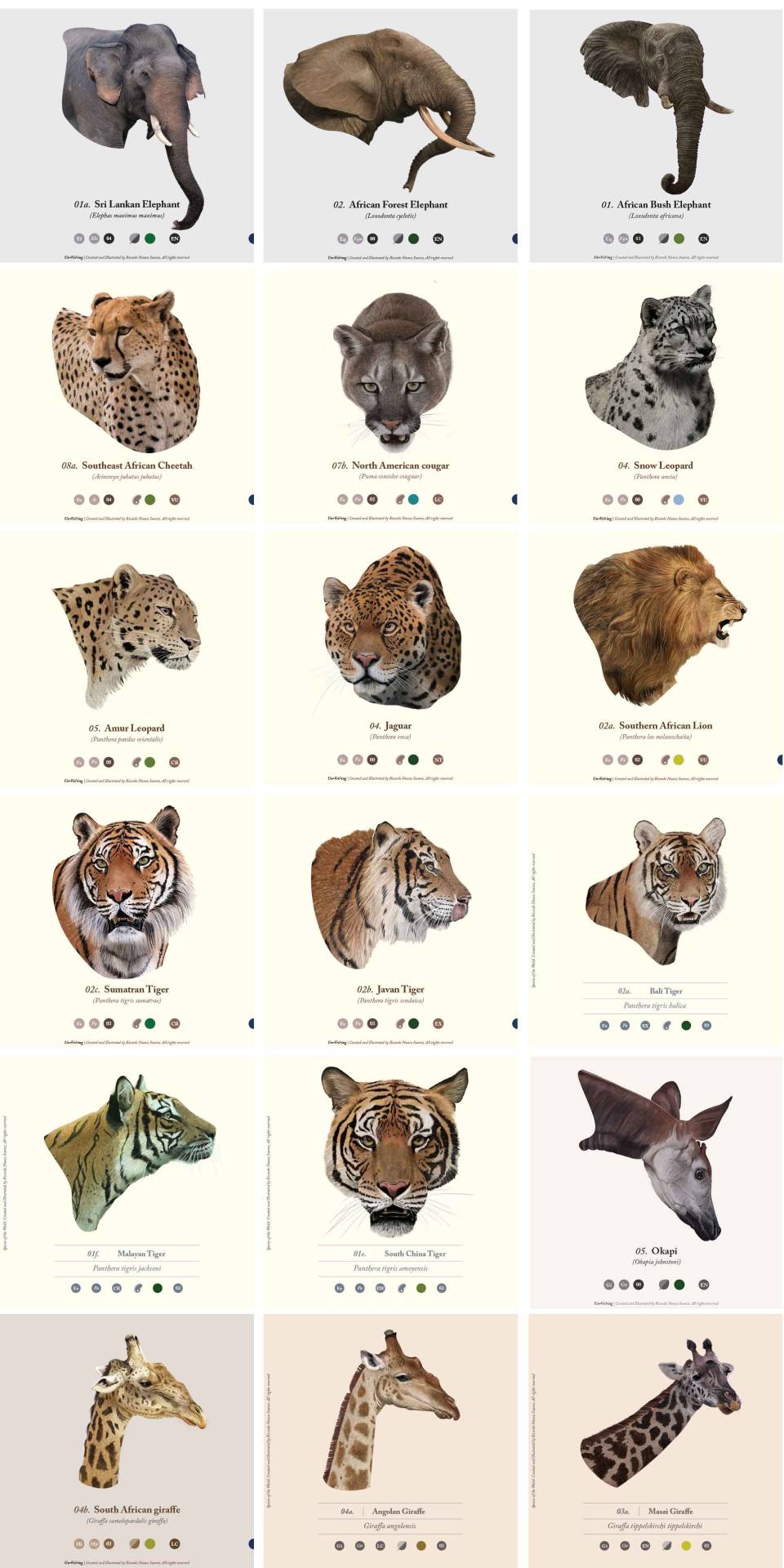Whales Are Divided Into Three Families. This Is The Second And Biggest: The Balaenopteridae, Which Contains



Whales are divided into three families. This is the second and biggest: the Balaenopteridae, which contains the biggest animal that ever inhabits the earth. However, we will start with its smallest member but also the fastest: the Mink Whale. This is the most common whale and is probably due to its not being commonly hunted by humans. Its size is too small (about 10m) and does not have enough oil yield, so hunting it is not worth it. Nonetheless, the hunting of this whale has increased.
Its name is confusing because it was first confused and classified wrongly. Its name is derived from the Norwegians who usually refer to any type of small whale as Minkie or Minkies' hval.
The Dwarf Mink Whale was described as a new subspecies not long ago and it is not sure yet if is one. Still has not scientific name. Mink Whale in captivity.
Mink whale has been tried to keep in captivity in Mito Aquarium, in Japan a few times. Most of the specimens died in few weeks while in 1956, the last one was able to scape a net aquarium after 37 days spinning the pool in the same direction.
____ I'm really ignorant of whales and most of this information is new to me. It is very hard to understand the information and translated it into something that I am able to explain. I hope is understood. ____ Thanks for your support. Likes, reblogging, or follows are very much appreciated.
Follow my Instagram Check out my Store.
More Posts from Rinusuarez and Others

New family, Pigs!!
What a great way to start! The Red River Hog, a very popular animal in zoos. Have you seen it? It was challenging to find a nice reference but I'm very happy with the one I found.
Check the process on my Instagram It will appear soon in the club. Consider joining here

Infographic here: https://www.instagram.com/species_of_the_world/

Can you differentiate between the skull of the white rhino and that of the black rhino? Let me know in the comments. Black and White Rhinoceros diverged five million years ago, and although different on the outside, on the inside are kind of similar. More about rhinos in the book that I am making. Be part of the club that witnessed the making of the most complete mammal encyclopedia joining the club here. Short on funds? Don't worry, you're not alone. If you can't contribute financially, consider sharing with others who might be interested. Follow are love. Cheers!




All the animals I illustrated last year. 60 in total. I finished 3 families and I began another 2. Let's see if this year I can beat that number... Thank you all for your support. Consider joining the club to see them all and to see how my quest of illustrating All the Mammals of the World is going. Here Instagram

Kerguelen Islands Commerson’s Dolphin
This subspecies was discovered in the 1950s. They own its name because they live close to the Kerguelen Islands south of the Indian Ocean. Actually, I just found the scientific name so I am not sure if that is the name of the animal. From what I read, they live close to the coast and prefer shallow waters. There are substantial physical differences between the two. This subspecies is larger but also its color patterns are different. The dark areas aren’t black but gray and the white area is more like light gray. Also, the demarcation between areas is more diffuse. In 2004 a vagrant individual (which is the name for an animal that is found out of its normal range) was found on the coasts of South Africa but no other sight has been notified.
_______________________________________________ Credits: Commerson's Dolphin _______________________________________________ Thank you, guys. If you like the content please like and subscribe. Reblogs are also very much appreciated because you are helping me to spread the word. Don't forget to check my Instagram account and my store. Links below. Instagram Store

Visayan Warty Pig
The Visayan Warty Pig has two subspecies that were recognized as such until 2000. Unfortunately, we have lost one of the subspecies, the Cebu Wart Pig and the other, the Negros Warty Pig is critically endangered.
Its biggest threat is habitat loss causing by commercial logging and farming. It is extinct in 98% of its native range.
Other studies indicated that there might be other subspecies of this Pig inhabiting the island of Panay in the Philippines.
Check out my store here Follow my blog about Species, here.

The South African Giraffe is the last member of the giraffe family I've been studying, and it's been quite an adventure. While I still struggle to identify some of the subspecies, I feel confident in recognizing most of them.
South African Giraffe
The South African Giraffe, also known as the Cape Giraffe, is a fascinating subspecies with a population of approximately 37,000 individuals. Interestingly, it was once extinct in some of its native areas in Southern Africa, but thanks to reintroduction efforts, its population has seen an impressive 150% increase. This is certainly good news for this subspecies, which is now a common resident in zoos, private farms, and ranches around the world.
With its distinctive coat pattern of cream-colored patches with orange-brown edges, the South African Giraffe is a unique and beautiful animal. While habitat loss, poaching, and trophy hunting continue to threaten their populations, conservation efforts are helping to protect these magnificent creatures for future generations to enjoy.
______________________________ Credits: South African Giraffe Photo Reference Credits: Sharon Verkuilen ________________________________ Thank you for being here. It will be awesome if you are here more often, so please like and subscribe, It will help me a lot. See you next week. Reblogging also qualifies as awesome.

The poster of the Camelidae family. What I like from this work is that I can see the improvement of my illustration. From the time that I began to now, I have put more attention to detail an accuracy keeping in mind that subspecies differences are often very small. I love what I am doing and I love to share it with all of you.
If you want to have this nice piece hanging in your wall, just follow the link below. They come in different sizes, prices and mediums. It will help me a lot. Also a like would be nice. Thank you all for your support. PD. On my instagram I will post the animals but as well part of the illustration process.
Posters: Here Follow my Instagram: Species of the World

Domestic Horse Countless of breeds of domestic horses that are divided in three categories: the Hot Blood, the Cold Blood and the Warm Blood. The horse has been crucial in to the evolution of the humans. It was one of the first animals domesticated and thanks to them we hav been able to conquer the world shorting distances, carrying or agriculture. We won’t be what we are now if is not because of the taming of the horse.
The three categories are divided like this: The Hot Blood of spirited horses are used for speed and its endurance. The Cold horse have the ponies and dwarf horses but also the biggest ones and are mostly used to heavy work and the warm blood which is a mixing of both is focusing in creating for specific riding purposes, mostly in Europe.
Follow my Instagram: Species of the World My store: Red Bubble store

Love this one! More from the Felidae family. The turn now is for the biggest in America. Jaguar At first glance, Jaguars and Leopards are not so easy to differentiate. They are like two brothers. One's appearance, the leopard, looks more graceful and stylized. While the Jaguar has a more bulky body and its legs are shorter. One is agile while the other one is made to wrestle. However, the biggest difference is that the leopard lives in Africa, Asia, and Oceania, while the Jaguar is found in America. So if you are in Kenya, be 100% sure you are seeing a leopard. _________________________________________ Photo Reference Credits: Gary Morris __________________________________________ Thank you guys for your support. Love in the way of likes reblogs and follows is very much appreciated. If is more than love, you can tip me too :). One animal or more every week. Would love to do more than one but the illustrating part takes a lot of time X(.
-
 badge-r liked this · 1 year ago
badge-r liked this · 1 year ago -
 rosebella2016 liked this · 2 years ago
rosebella2016 liked this · 2 years ago -
 808beat liked this · 3 years ago
808beat liked this · 3 years ago -
 creeksoil reblogged this · 3 years ago
creeksoil reblogged this · 3 years ago -
 creeksoil liked this · 3 years ago
creeksoil liked this · 3 years ago -
 glisteringlord liked this · 3 years ago
glisteringlord liked this · 3 years ago -
 nunzia-scientificillustration liked this · 3 years ago
nunzia-scientificillustration liked this · 3 years ago -
 pointinfusionsblog liked this · 3 years ago
pointinfusionsblog liked this · 3 years ago -
 dervickwinellie20 liked this · 3 years ago
dervickwinellie20 liked this · 3 years ago -
 symon-h liked this · 3 years ago
symon-h liked this · 3 years ago -
 onyxwolves liked this · 3 years ago
onyxwolves liked this · 3 years ago -
 theyellowjester liked this · 3 years ago
theyellowjester liked this · 3 years ago -
 sewer-olm liked this · 3 years ago
sewer-olm liked this · 3 years ago -
 puppygirlinyourmomsbed reblogged this · 3 years ago
puppygirlinyourmomsbed reblogged this · 3 years ago -
 puppygirlinyourmomsbed liked this · 3 years ago
puppygirlinyourmomsbed liked this · 3 years ago -
 hjvhj-blog2 liked this · 3 years ago
hjvhj-blog2 liked this · 3 years ago -
 panda-poes reblogged this · 3 years ago
panda-poes reblogged this · 3 years ago -
 rudeteens liked this · 3 years ago
rudeteens liked this · 3 years ago -
 13000-ants liked this · 3 years ago
13000-ants liked this · 3 years ago -
 a-horses-ass liked this · 3 years ago
a-horses-ass liked this · 3 years ago -
 american-virtues liked this · 3 years ago
american-virtues liked this · 3 years ago -
 rudeteens reblogged this · 3 years ago
rudeteens reblogged this · 3 years ago -
 numerosix liked this · 3 years ago
numerosix liked this · 3 years ago -
 melly-fox liked this · 3 years ago
melly-fox liked this · 3 years ago -
 tinylongwing liked this · 3 years ago
tinylongwing liked this · 3 years ago -
 craniumsandcrayons liked this · 3 years ago
craniumsandcrayons liked this · 3 years ago -
 rinusuarez reblogged this · 3 years ago
rinusuarez reblogged this · 3 years ago
By Ricardo Nunez Suarez. All Rights Reserved. Feel free to reblog. For collaboration or liscensing please contact rhinunez@gmail.com
221 posts